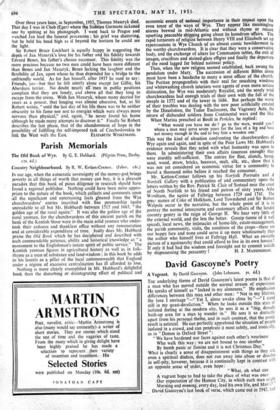Parish Memorials
The Old Book of Wye. By G. E. Hubbard. (Pilgrim Press, Derby. 1 23. 6d.)
Country Neighbourhood. By R. W. Ketton-Cremer. (Faber. iss.) IN our age, when the autocratic sovereignty of the money-god, brings poverty in all things of worth that money can buy, it is a pleasant paradox that this book of pious diligence in research should have found a regional publisher. Nothing could have been more appro- priate to the nature of the book, which collects and comments upon all the significant and entertaining facts gleaned from the Wye churchwardens' entries inscribed with fine penmanship (quite unreadable to all but Mr. Hubbard) between 1515 and 1663, "the golden age of the rural squire." It was also the golden age of the rural yeoman, for the churchwardens of this ancient parish on the bank of the Kentish Stour were in the main solid yeomen who under- took their arduous and thankless office without any remuneration and at considerable expenditure of time. Justly does Mr. Hubbard praise the Old Book which he has deciphered and described with such commendable patience, ability and historical knowledge as a monument to the Englishman's innate spirit of public service." The Kentish yeoman figures in agricultural history as well as in folk- rhyme as a man of substance and land-wisdom ; in this book he adds to his laurels as a pillar of the local commonwealth that England under a regime of excessive centralisation has ill afforded to lose.
Nothing is more clearly exemplified in Mr. Hubbard's delightful book than the disturbing or disintegrating effect of political and
economic events of national importance in their impact upon the even tenor of the ways of Wye. They appear like meaningless storms brewed in mid-Atlantic and without rhyme or reason upsetting peaceable shipping going about its humdrum affairs. The rapid turnovers of religion between Henry VIII and Elizabeth set up repercussions in Wye Church of an almost comic bewilderment to the worthy churchwardens. It is clear that they were a conservative
body, and the exchange of altars for Communion tables, the exit of images, crucifixes and stained-glass effigies and finally the departure of the rood lagged far behind national policy.
Then, when the new religion seemed established, back swung the pendulum under Mary. The succession of different Bibles alone must have been a headache to many a stout officer of the church. The Puritan propagandists with their zeal for smashing windows and whitewashing church interiors were agents of even more serious dislocation, for Wye was moderately Royalist, and the sorely tried churchwardens had enough trials of their own with the fall of the steeple in 1572 and of the tower in 1686. But perhaps the worst of their troubles was dealing with the new poor artificially created by the Dissolution, the Tudor Enclosures, the Vagrancy Acts, the return of disbanded soldiers from Continental wars and the like.
When Marina preached at Boult in Pericles, he replied: "What would you have me do ? go to the wars, would you ? where a man may serve seven years for the loss of a leg and have not money enough in the end to buy him a wooden one."
This was the kind of situation confronting the churchwardens of Wye again and again, and in spite of the Poor Laws Mr. Hubbard's evidence reveals that they acted with what humanity was open to them. In administering their own affairs (onerous enough) they were sturdily self-sufficient. The entries for flint, clunch, hemp, sand, wood, straw, bricks, beeswax, malt, silk, etc., show that it was not yet considered an economic virtue for a commodity to travel a thousand miles before it reached the consumer.
Mr. Ketton-Cremer follows up his Norfolk Portraits and A Norfolk Gallery with a publication of and commentary upon the letters written by the Rev. Patrick St. Clair of Sustead near the coast of North Norfolk to his friend and patron of sixty years, Ashe Windham, the squire of Felbrigg between 1729 and 1741. The great names of Coke of Holkham, Lord Townshend and Sir Robert Walpole occur in the narrative, but the whole point of it is to portray the normal intercourse and customary affairs of the landed country gentry in the reign of George II. We hear very little of the external world, and the less the better. Gossip (some of it well spiced), local news, the intimacies of home-life, estate-management, the parish _community, visits; the condition of the crops—these are our happy fare and none could serve it up more wholesomely than the author who himself lives at Felbrigg Hall. What an enviable picture of a squirearchy that could afford to live in its own houses ! If only it had had the wisdom and foresight not to commit suicide
by dispossessing the peasantry ! Fl. J. MASSINGHAM.


































 Previous page
Previous page